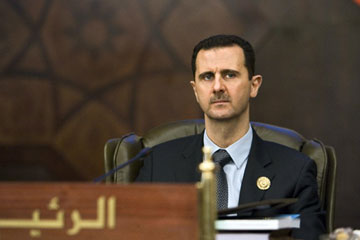
President Bashar al-Assad of Syria presides over the annual Arab summit meeting in Damascus on Saturday, March 29, 2008.
(2 of 4)
But while Hafez received only lingering international scorn for his assault on Hama, Bashar now faces the prospect of U.S.-led air strikes. In Washington, lawmakers are debating an appropriate response to the chemical-weapons attack: Should the dictator merely be delivered a glancing blow, enough to ensure he doesn't use those weapons again, or should his military be crippled, allowing the rebels to topple him? In Damascus, the mood is a mix of sanguine and defiant. In a recent interview with France's Le Figaro newspaper, Assad dismissed Obama as "weak" and warned that action against his regime would destabilize the entire Middle East. He rejected the idea of a political settlement with the rebels, saying that "80% to 90%" were "terrorists" belonging to al-Qaeda. "The only way to deal with them is to annihilate them," he said. Although few Western journalists are allowed into Damascus, rebel commanders and witnesses tell TIME that the military has been scattering its assets and moving personnel to civilian areas in anticipation of the air strikes.
In the city where Hafez survived the assassination attempt, his son expects to outlast his enemies, domestic and international. Officials and friends of the dictator tell Time that he believes the civil war is a repeat of his father's battle against the Brotherhood. "Muslim fanatics nearly killed his father, [and] to Assad, they are back," says a former government official who has long known the Assads and still maintains ties to the regime. "He believes he is the last bastion of resistance against the Islamic terror threat. He does not care if people will still be calling him a murderer in 10 years, because he knows in 100 years he will be called a hero."
Second-Choice Successor
Never mind a hero, his father had intended Bashar to be no more than a footnote in Syria's history. The presidency was reserved for his older brother Bassel, a charismatic athlete favored by their father. Hafez schooled Bassel in both war and politics from a young age, determined that his firstborn son would carry on his vision for a strong, unified Syria. Bashar, as the second of four sons, was kept away from the political and military instruction that made up Bassel's education. The senior Assad, scarred by his own conflicts with a power-hungry brother that included an attempted coup, wanted to make sure that Bassel, as the appointed heir, would not face similar competition, says British author Patrick Seale, an old family friend and author of a biography of Hafez, Asad [sic]: The Struggle for the Middle East.
According to childhood friends, Bashar was a middling student--introverted, stubborn and moody but also loyal and modest. He overthinks things, say friends and colleagues, and has a hard time making decisions. He tends to go with the advice of the last person he consults. That indecisiveness, combined with a fierce stubbornness, is at the root of his sometimes unpredictable behavior, says the former official. "He comes off as weak, but that is because he is more analytical than his father. He wants to consider all the angles and is incapable of making snap decisions," says an official who has recently seen Assad. "The weak chin is as much metaphorical as physical."
